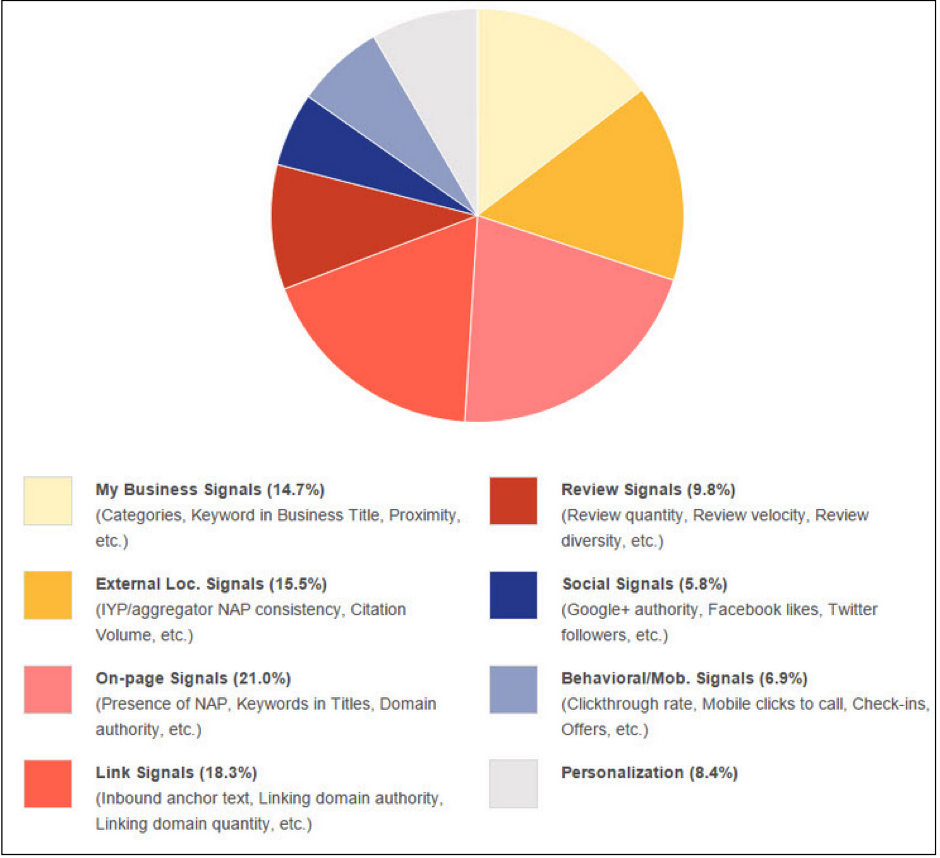If you own a local business, I can't put enough emphasis on the importance of a well-planned local search strategy. As you might already know, mobile devices, such as smartphones and tablets, are taking over the digital marketing space. But what you might not know is that of the estimated 30 billion annual mobile searches, 12 billion are local searches (Search Engine Land).
I'll let the numbers speak for themselves. If you don't implement a strong local strategy, woohoo you're sitting on the sideline while all of your local competitors are receiving traffic and conversions from local searches. From strategy to ranking factors, local SEO is a different animal than the average SEO campaign. The pie chart below is a great illustration of the various ranking factors associated with local SEO.
Let’s break down a few of these ranking factors.
Local On-Page SEO
Not surprisingly, on-page optimizations hold more weight than any other ranking signal. Similar to non-local on-page SEO tactics, your local on-page SEO strategy should still strive to get the most value out of your content. Some on-page strategies include local keyword focused meta and content optimizations, schema.org markup, embedded map implementation, as well as having a mobile-friendly website.
Google My Business
External Location Signals, especially your Google My Business page, are crucial when rolling out your local strategy. In order to be acknowledged by Search Engines, you'll need to claim your Google My Business page. This process just verifies that the business you are claiming is in fact your business. This can either be done over the phone or via mail. Setting up Google My Business is a fairly easy and straightforward process. Be sure to include all the necessary information about your business such photos, phone number, business address, hours, category, unique descriptions, ect. It's important that all this information is consistent across your website and all local directories.
Local Reviews
Spending time on obtaining customer reviews not only directly impacts local rankings, but it also acts as a behavior influence towards prospective customers. A recent study by BrightLocal suggests that 88% of consumers trust online reviews as much as personal recommendations. Whether acquiring Yelp, Google, or other local directory reviews, a local review strategy is crucial for ranking locally.
Local Link Building
While this might be the most difficult local SEO tactic to achieve, link building is still a sizable local ranking factor. Similar to a normal link-building strategy, a local link-building campaign focuses on acquiring links from local events, local awards, local publications, and so on. Like any link-building strategy, don't be afraid to get creative.
Citations
For local search, a citation is a web mention of your business' name, phone number, address, or link. While local directories don't pass as much link authority as they once did, local directory citations are still a useful resource for local ranking signals. Whether you obtain citations manually, by a third party upload, or via competitive analysis, it's important that your business' name, address, and phone number remain consistent across all directories. Inconsistent citations could raise red flags and potentially harm rankings.
Conclusion
Mobile searches are increasing every day and with it are local related queries. Local SEO is no longer a competitive advantage, but a strategic business necessity. Don't stand idle when a significant amount of quality traffic is going to your local competitors. Contact Rhythm to get your local SEO strategy launched today.
More Resources:
Top 10 Insights on Local Search & Marketing (2015 Local Search Assoc. Conference)




